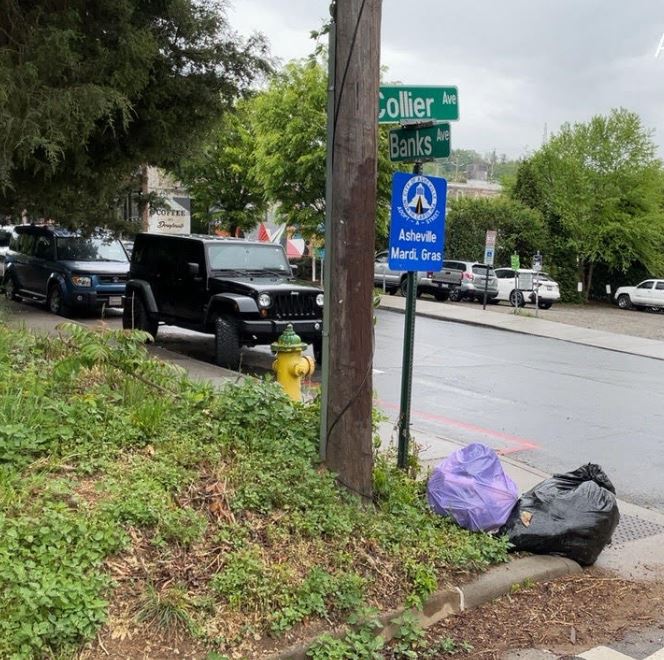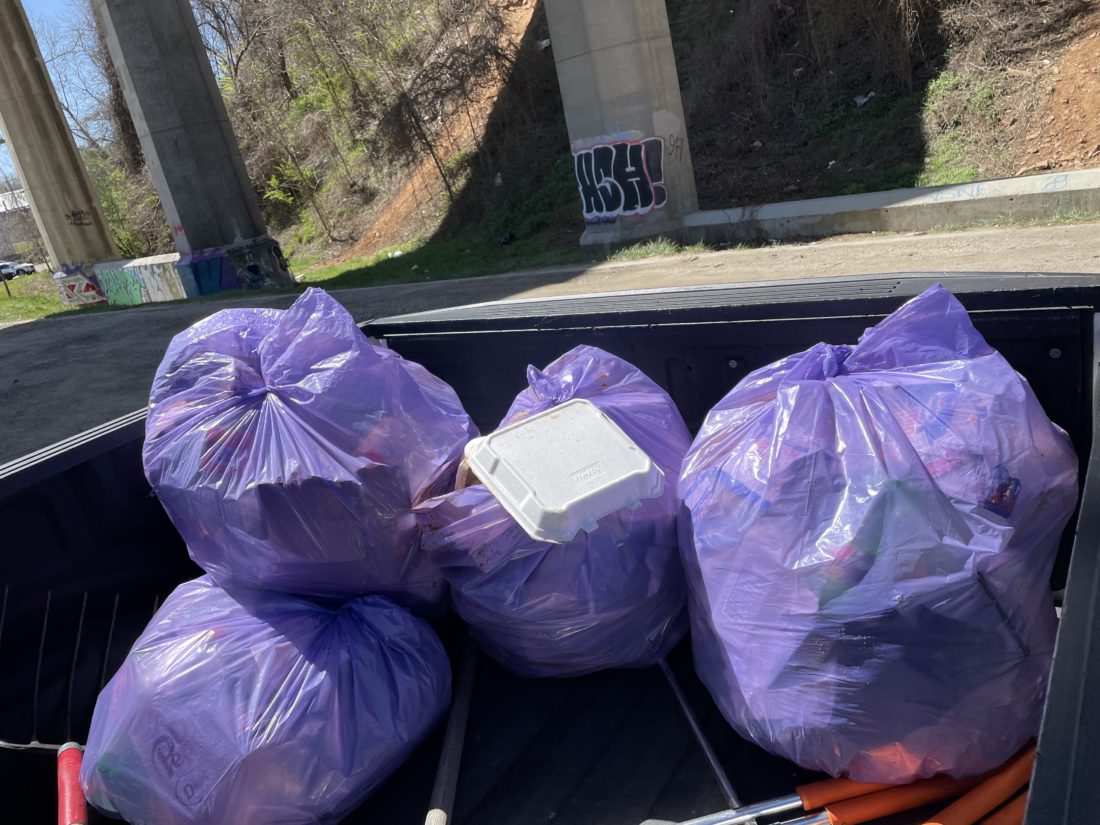Among the complaints Asheville residents have about their city, litter is one that most can agree on. A new pilot program initiated this spring by the city Public Works Department seeks to address an underserved population by the city’s Sanitation Division services: people who are unhoused.
“We’ve heard from a lot of unhoused people and community members that [they] don’t have a lot of ways to dispose of their trash, and that can lead to litter,” says city Sanitation Division Manager Jes Foster.
Beginning March 30, dozens of city employees have distributed free purple trash bags to unhoused people. These include the Sanitation Department, the Parks & Recreation Department, the Asheville Police Department and the community responder program within the Asheville Fire Department, which is part of Asheville’s 60-day downtown safety initiative that began May 1. Foster says the purple bag program is not formally part of the downtown safety initiative, but it addresses a similar goal of addressing litter. The community paramedics in Buncombe County Emergency Medical Services also have bags to distribute, as does the city’s litter collection contractor.
The bags are purple — a different color from the trash bags used by most households or businesses — to signify its contents may contain biohazardous materials. (Foster notes that her division does not purchase or distribute sharps containers for the disposal of used syringes.) The unique color also clarifies the city’s responsibility for pickup rather than private waste removal services.
How it works
The staff at the Sanitation Division frequently interacts with the unhoused population, especially at encampments. “We were occasionally and unofficially handing out trash bags when we went to [encampment] sites. But there wasn’t a concerted effort” to address this population’s litter until the purple bag pilot, Foster says.
Additionally, Asheville’s Parks & Recreation Department and the Sanitation Division of Public Works have contracted numerous times with a private company to remove biohazardous waste.
When distributing purple bags, participating partners are instructed to tell people to place tied purple bags in a location that’s easy to access, like the roadside or near an existing trash receptacle.
Foster says the Sanitation Division staff is cautious about disposing of black trash bags from encampments because they may contain personal items. “What we’ve heard is that those black heavy-duty trash bags are really valuable to unhoused folks for storing and waterproofing their belongings,” she explains. “If we see a purple bag, we know it’s for us to pick up.”
The cost of the pilot comes from the Public Works budget, Foster says, estimating it purchases 250 bags for about $100.
The Sanitation Division picks up purple bags visible on the roadside or those left behind at a vacated encampment. “Our [Sanitation Division] folks are already visiting encampments,” says Foster. “We’re already out picking up trash. We’re not doing any extra work to make it happen.” Community members can report the presence of purple bags as well.

Foster estimates over 400 purple bags have been distributed in total. However, the scope of the project is too wide ranging to provide accurate data on how many have been used and collected. “It was a nice idea at first to try to track how many bags were collected,” she explains. “But we have so many different partners distributing and collecting bags that it was really difficult to track.”
The cities of Austin, Texas, Seattle and Tacoma, Wash., have municipal programs to distribute trash bags to unhoused people. Foster says Asheville didn’t consult with any other municipalities on how their programs operate.
A matter of dignity
Dustin Mailman, pastor of family ministries and missions at Trinity United Methodist Church, says he learned of the purple bag pilot in late May from the community paramedics. He says trash has been “an ongoing issue at Trinity,” located on Haywood Road at Balm Grove Avenue, and he’s had conversations with neighbors about finding a solution “that was both dignifying and didn’t create any extra effort for the church.”
The community paramedics gave Mailman about 20 purple bags, which he distributed. “It’s helped our space stay in tip-top shape. … I think it’s making a difference,” he says. The purple bag pilot has “further illustrated to me, when people have a place to throw their garbage away, they will throw it away.”
At first, Mailman wondered if the unusual color of the bags would be stigmatizing to recipients. But he came to a different conclusion once he saw the purple bags in use. Those bags say the trash belongs to a person who is unhoused, which is “a symbol in my eyes that the folks on the streets in Asheville do care as much about property as much as others do,” he says.
Foster says the Sanitation Department has also given purple bags to Homeward Bound of Western North Carolina, which provides services to the unhoused population. “We’re trying to get them into the hands of as many service providers as we can who are interacting with unhoused folks,” she says.
“Outreach has been giving out purple bags to individuals we connect with in the community,” confirms Homeward Bound outreach team lead Mike DeSerio. “People were grateful to have a quicker way to get rid of their trash and keep their camp clean.”
DeSerio says Homeward Bound has already “been routinely giving out regular black trash bags” to be used for trash, to carry belongings or for rain cover. “When offering the purple bags over recent weeks and explaining they are only for trash that can be left roadside for expedited pickup, the campers were grateful,” he says.
Mailman hopes that when the efficacy of the purple bag pilot is assessed, it will be made permanent. But he also underscores that this pilot addresses only one piece of the needs of people without housing and that access to bathrooms is a “greater issue.”
“If people don’t want to see poop on the sidewalks, these trash bags are a great place to put that — at least for now,” Mailman says. He acknowledges that in general people find the topic of bathroom access disgusting but says it is a matter of dignity and should be addressed more directly.
Temporary or permanent?
The purple bag pilot has been viewed with some caution by community members who are concerned it legitimizes the existence of homeless encampments.
Information about litter programs on the Sanitation Division’s website reads, “the pilot program does not document or sanction camps. Our pilot program is supported by the Homeless Initiative Advisory Committee (HIAC) Outreach and Encampment Response group and is meant to be an interim option to help solve sanitation issues while more permanent solutions are developed and recommended by HIAC.”
Helen Hyatt, vice president of the Coalition of Asheville neighborhoods, a community group, and a member of the Outreach and Encampment Work Group for HIAC, hopes to see the pilot eventually phased out. DeSerio from Homeward Bound is also a member of the Outreach and Encampment Work Group. Mailman from TUMC is a member of HIAC.
“If there is significant improvement in sanitation in encampments area, and people are picking up all their unused items, the program should continue up until HIAC has implemented the [National Alliance to End Homelessness] roadmap,” Hyatt wrote Xpress in an email, referring to recommendations for curbing homelessness that the nonprofit presented to the city and county in February. “The program should phase out after that time,” she wrote.
Homeless strategy division manager Emily Ball declined to comment on the purple bag pilot, calling it “a Sanitation [Division]-driven initiative.”
Do you have more to add to this story? Contact the author at jwakeman [at] mountainx.com.



“Homeless strategy division manager Emily Ball declined to comment on the purple bag pilot, calling it ‘a Sanitation [Division]-driven initiative.'”
This seems a curious response in light Emily Ball’s position, and coming in the wake of so many recent calls for better coordination, and better sharing of information among all those engaged in service provision for the homeless.
Wonder what the homeless strategy division does? How big is a division?
“The cities of Austin, Texas, Seattle and Tacoma, Wash., have municipal programs to distribute trash bags to unhoused people. Foster says Asheville didn’t consult with any other municipalities on how their programs operate.”
Yep, why ask around to see if it helps or not?
Trash bags? Really? Okay, I guess that’s cheaper than actually doing something productive, like BUILDING MORE HOUSING THAT PEOPLE CAN ACTUALLY AFFORD. Man people in charge are not any smarter than the rest of us. If they were, there would be a solution by now. How much did that “homeless study” cost? How much could we have done for the houseless with that money?
Come on Lou. The money from the bags could have build roughly 1 sqaure foot of housing. Should they have done that?
Let’s be real. All those collecting a paycheck to manage or provide anything for the homeless DON’T want homelessness to end and take away their big fat paychecks. Look up what Emily Ball or any of the others make annually. Beloved gets millions in grants to hand out sleeping bags and, of course, get paid.
I don’t understand any criticism of this bag program. It’s probably the most bang-for-the-buck we’ve gotten from anything around here in years.